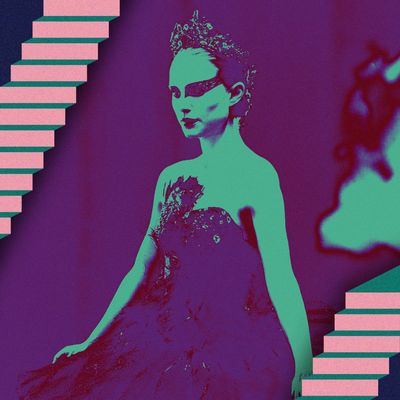
In this micro-series, the Cut revisits five Hollywood classics about female ambition.
I didn’t see Black Swan when it came out in 2010 because I was 14 years old and rarely watched movies with anyone other than my family. Still, I remember that it was truly everywhere: A New York profile of the director, Darren Aronofsky, called it “unquestionably the love-it-or-hate-it movie of the year.” It made $329.4 million at the box office, more than covering the $13 million budget, won Natalie Portman her first and only Oscar, and spurred many a think piece: about its sexism, its symbolism, its portrayal of ballet, its duality … did I mention the sexism?
The basic plot revolves around a ballerina named Nina (Portman), who lives in a claustrophobic Upper West Side apartment with her mother, Erica (Barbara Hershey). Her room has the twin bed, stuffed-animal collection, and frilly pink décor of a child’s, and she doesn’t seem to do much of anything other than hang out with her mom and dance.
The ballet where she works is run by Thomas Leroy (Vincent Cassel), a choreographer with a French accent, a huge turtleneck collection, and a penchant for sexual harassment. When he decides to replace Beth (Winona Ryder), the longtime principal dancer of the company, in the role of Swan Queen in Swan Lake — a story about Odette, the Swan Queen, who falls in love with a prince, and Odile, the Black Swan, who seduces the prince, prompting Odette to kill herself — he chooses Nina despite concerns that she’s too “frigid” to play the Black Swan. Lily (Mila Kunis), a new dancer in the company who has come from San Francisco, is the relaxed, sensual foil to Nina’s stiff perfectionist. Over the course of the movie, the emotional abuse from her mother and her choreographer, along with the enormous pressure she puts on herself, sends her into an increasingly horrifying spiral.
The film was widely criticized for what it seemed to be saying about ambitious women. If we take Black Swan as an allegory, it’s easy to say that the message is something like: “Ambition is destructive to women. Women who achieve professional success can only do so at the cost of completely destroying their already minimal personal lives.” It’s a cliché seen everywhere from The Devil Wears Prada to countless holiday rom-coms — women who work a lot are unhappy, single or having relationship problems, and often mean. And it is sexist to tell women that they alone shouldn’t be so ambitious. But the idea that unbridled career ambition can be unhealthy? I think we’ve learned that’s true, for all genders.
What actually struck me most about the film was the idea that Nina was bringing about her own downfall — that she was the only one standing in her own way on her quest to perfection — which is also what capitalism tells us when overwork doesn’t … work. If you’re failing and flailing, it’s your fault somehow. This was what felt most relevant to the much-transformed society we find ourselves living in today, or at least to my experience within it.
I think I can say confidently that I’m not alone in having experienced a huge deterioration in my mental health over the last two years. And as much as I repeat to other people that we should all be giving ourselves some grace, that we shouldn’t value our productivity over our mental health, I so often tell myself the opposite — that, like Nina, I’m just standing in my own way. That I should be able to function on five hours of sleep, because I always could before. I should be able to handle a schedule that keeps me busy from 8 a.m. to 10 p.m. or later every day! I should be able to finish a task in two hours! I could before!
Obviously, there are external factors affecting my ability to do things — namely, depression and anxiety. In Black Swan, Thomas and Erica both contribute to Nina’s spiral with their abusive behavior, and her worsening mental health does the rest. Nina may not be inspiring or a good role model. She’s definitely not a girlboss. Despite her winged delusions, she’s only human — she feels real, now more than ever, as our collective mental health continues to spiral. I remember the early 2010s as a happier time, but the dark world Nina occupies, so devoid of hope, feels like the inside of my head after a solid hour (or several) of doomscrolling.
If the 2010s were the age of ambition, the age of the girlboss, then I think the 2020s are the age of chilling the fuck out. I think we should, and are starting to, think differently about ambition — what does ambition look like when we reorganize our priorities, as so many of us have attempted to, so that they’re less about the capitalist idea of success, and more about building a life that brings us joy?
Since the ending of Black Swan was left ambiguous, here’s what I’ve decided happens: Nina wakes up in the hospital having survived her self-inflicted wound. She moves out of her mother’s apartment. She gets a therapist. She gets friends. She uses the money I presume she’s saved up from living with her mom to take a real break. Maybe she returns to the ballet, maybe she becomes a teacher, or maybe she gets really into yoga or carpentry. But her ultimate ambition is to heal.
More From This Series
- Love & Basketball Doesn’t Sacrifice Anything for the Happy Ending
- Where Is the Future That Baby Boom Promised?
- In Norma Rae It’s Worker Solidarity First, Ambition Second


